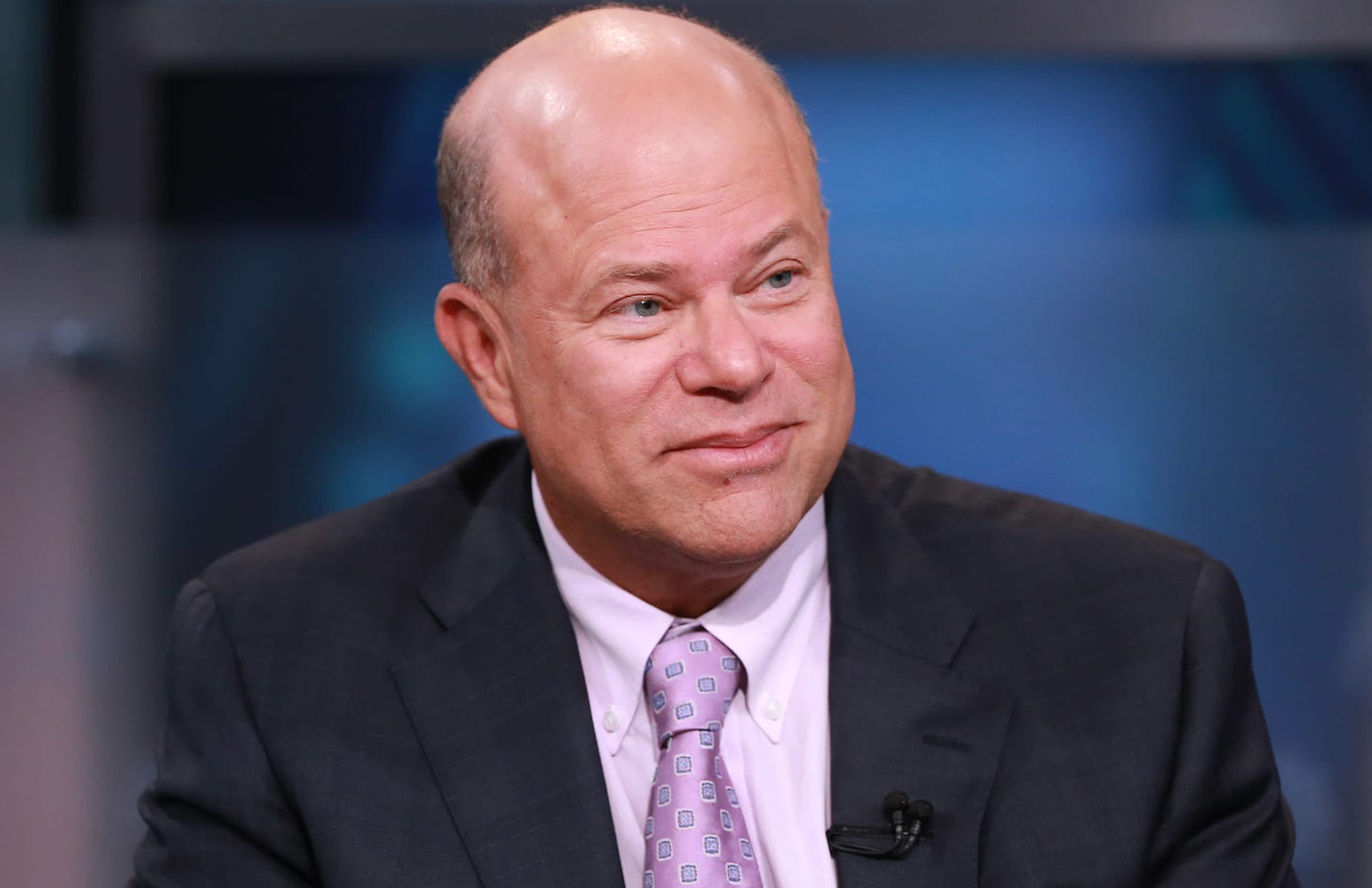David Tepper: The King of Bouncing Back
“For better or worse we’re a herd leader. We’re at the front of the pack. We're one of the first movers. First movers are interesting; you get to the good grass first, or sometimes the lion eats you."
This is the first part of two on David Tepper. You can find the second part here.
In late 2008, David Tepper experienced the third sharp drawdown of his career. His Appaloosa fund was down 27 percent as the financial crisis battered markets. He had survived previous crises - the Russian default in 1998 and the implosion of the dotcom and telecom bubbles in 2002. In each case, he had roared back. “We’re consistently inconsistent,” Tepper explained. “It’s one of the cornerstones of our success.”
"Investing with David is like flying, with hours of boredom followed by bouts of sheer terror," a long-time client commented. "He's the quintessential opportunist, investing in any asset class, but you have to have a cast-iron stomach."
After successfully buying distressed debt in 2002, Alan Fournier gave Tepper a pair of brass testicles, “cartoonishly huge and grotesquely veiny” as New York Magazine described them. The balls came with a plaque inscribed with the words ‘The Most Valuable Set of All Time.’
“We’re not afraid to lose money. Hence the plaque,” Tepper said. “It should say, we’re not afraid to make money.”
While working on a big trade, Tepper reportedly called Fournier, who had departed to found Pennant Capital, screaming into the phone: “I’m rubbing your balls for good luck!”
It’s Tepper’s high conviction “ballsy” style and his humor that make him one of the most fun and fascinating investors to study. He once called himself “the Mother Teresa of the markets” because he was always there “to make sure [securities] don't go down more.”
Tepper came to Wall Street without an Ivy League degree but with a chip on his shoulder. After he was passed over for partner at Goldman Sachs, he seemed to revel in his role as the outsider and regularly took pot shots at his industry.
"The media says that hedge funds are the new masters of the universe," he chuckled. "We're just a bunch of schmucks."
Perhaps. But from Appaloosa’s inception in 1993 until its conversion to a family office in 2019, Tepper compounded its capital at more than 25 percent net of fees. Which at the very least made him and his investors quite wealthy schmucks.
But at the end of 2008, in the depths of the financial crisis, the ballsiest investor on Wall Street was pondering his next move. How was he going to bounce back this time?
Growing up in Pittsburgh
“I used to think buildings were black because that was just the color they made them. But they were black because of the soot.”
Tepper was born in 1957, the son of an accountant and a teacher. The middle child of three, he grew up in Pittsburgh’s lower middle-class Stanton Heights neighborhood. He described himself as a “big kid,” “a joker,” and “well-liked.” “We played touch football in the street and tackle football in a nearby cemetery,” he recalled “We tried to not hit the gravestones.” Tepper was kicked out of one class and told to “roam the halls and act like the animal you are” by a teacher. Local football games were canceled for two seasons because there were too many fights.
But Tepper also developed an excellent memory and a knack for math (“I could barely even talk at the time but I could do math.”). “He was analytical,” remembered his brother, Scott. “We had a railing on our porch, and he would be like, ‘If I put my head in there, would I get stuck?’”
Tepper once told students at Carnegie Mellon that “there's nobody on earth you owe more to than your parents. In life, you should recognize your parents.” But the relationship with his own father was difficult. Tepper’s father was “not a warm and cozy guy” and “worked all the time.” Tepper also once shared that his father was “physically abusive,” a cycle that Tepper was proud to break. And yet, he learned important lessons from him: to “always think about charity and those less fortunate,” and to follow the Golden Rule: to treat everyone the same and with respect (both the “president and the garbage man” as Tepper said).
Tepper caught the bug for stocks early on and started tracking his father’s portfolio. When he had to pay his way through college, he figured out his first trading strategy:
“I had some scheme going where I was taking advantage of small moves in the market by buying options. It was like clockwork. I would put in orders at a sixteenth of a point and sell at an eighth and pay a dollar or two for commission and come out way ahead. It was just a little anomaly in the market at the time, and it was a really steady income.”
“It was funny, in high school I never had an “A,” but in college I almost never didn’t have an A.”
Republic Steel
Keep reading with a 7-day free trial
Subscribe to Frederik's Age of Alchemy to keep reading this post and get 7 days of free access to the full post archives.




